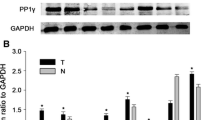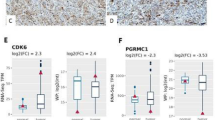Abstract
Purpose
Although deletions or inactivating mutations of the tumor suppressor gene PTEN (phosphatase and tensin homolog deleted on chromosome 10) are involved in the development of a variety of tumors including glioblastoma, melanoma, prostate cancer, breast cancer, endometrial cancers etc., the role of PTEN expression in human primary hepatocellular carcinoma (HCC) has not yet been clarified. The aim of this study is to investigate the involvement of PTEN mRNA and protein expression in HCC.
Methods
The level of PTEN mRNA expression in HCC specimens was analyzed by Northern blot. PTEN poly-clonal antibody was raised by immunizing New Zealand white rabbit with (His)6-tagged PTEN fusion protein and characterized by Western blot. The level of PTEN protein expression was determined by immunohistochemistry. The significance of PTEN in HCC was analyzed by comparing its expression level with the clinicopathological parameters of HCC patients.
Results
Four transcripts of PTEN mRNA at 5.5 kb, 4.4 kb, 2.4 kb, and 1.8 kb were detected in most para-carcinoma liver tissues, and the expression level of PTEN mRNA in carcinoma liver tissues was found to decrease significantly. The poly-clonal antibody raised against histidine-tagged fusion PTEN protein showed specific immuno-reactivity to PTEN protein. Using the specific poly-clonal antibody prepared and characterized by ourselves, we found that PTEN protein was significantly down-regulated in HCC tissues compared with paired para-carcinoma tissues. The protein expression of PTEN is negatively associated with the pathological grading and presence of cancer thrombus of HCC.
Conclusions
Down-regulation of PTEN expression may play an important role in the development of HCC and the level of PTEN expression may be a potential adjuvant parameter in forecasting the progression and prognosis of HCC patients.



Similar content being viewed by others
References
Bonkhoff H, Fixemer T, Hunsicker I, Remberger K (2001) Progesterone receptor expression in human prostate cancer: correlation with tumor progression. Prostate 48:285–291
Cantley LC, Neel BG (1999) New insights into tumor suppression: PTEN suppresses tumor formation by restraining the phosphoinositide 3-kinase/AKT pathway. Proc Natl Acad Sci USA 96:4240–4245
Celebi JT, Shendrik I, Silvers DN, Peacocke M (2000) Identification of PTEN mutations in metastatic melanoma specimens. J Med Genet 37:653–657
Cheng A, Dube N, Gu F, Tremblay ML (2002) Coordinated action of protein tyrosine phosphatases in insulin signal transduction. Eur J Biochem 269:1050–1059
Chomczynski P, Sacchi N (1987) Single-step method of RNA isolation by acid guanidinium thiocyanate-phenol-chloroform extraction. Anal Biochem 162:156–159
De Vivo I, Gertig DM, Nagase S, Hankinson SE, O'Brien R, Speizer FE, Parsons R, Hunter DJ (2000) Novel germline mutations in the PTEN tumour suppressor gene found in women with multiple cancers. J Med Genet 37:336–341
Dunbar BS, Schwoebel ED (1990) Preparation of polyclonal antibodies. Methods Enzymol 182:663–670
Elo JP, Visakorpi T (2001) Molecular genetics of prostate cancer. Ann Med 33:130–141
Fujiwara Y, Hoon DS, Yamada T, Umeshita K, Gotoh M, Sakon M, Nishisho I, Monden M (2000) PTEN/MMAC1 mutation and frequent loss of heterozygosity identified in chromosome 10q in a subset of hepatocellular carcinomas. Jpn J Cancer Res 91:287–292
Gu J, Tamura M, Yamada KM (1998) Tumor suppressor PTEN inhibits integrin- and growth factor-mediated mitogen-activated protein (MAP) kinase signaling pathways. J Cell Biol 143:1375–1383
Guo SP, Wang WL, Zhai YQ, Zhao YL (2001) Expression of nuclear factor-kappaB in hepatocellular carcinoma and its relation with the X protein of hepatitis B virus. World J Gastroenterol 7:340–344
Gray IC, Stewart LM, Phillips SM, Hamilton JA, Gray NE, Watson GJ, Spurr NK, Snary D (1998) Mutation and expression analysis of the putative prostate tumour-suppressor gene PTEN. Br J Cancer 78:1296–1300
Hsu SM, Raine P, Fanger H (1981) The use of antiavidin antibody and avidinbiotin-peroxidase complex in immunoperoxidase technics. Am J Clin Pathol 75:816–821
Latta E, Chapman WB (2002) PTEN mutations and evolving concepts in endometrial neoplasia. Curr Opin Obstet Gynecol 14:59–65
Leslie NR, Downes CP (2002) PTEN: The down side of PI 3-kinase signalling. Cell Signal 14:285–295
Li DM, Sun H (1997) TEP1, encoded by a candidate tumor suppressor locus, is a novel protein tyrosine phosphatase regulated by transforming growth factor beta. Cancer Res 57:2124–2129
Li J, Yen C, Liaw D, Podsypanina K, Bose S, Wang SI, Puc J, Miliaresis C, Rodgers L, McCombie R, Bigner SH, Giovanella BC, Ittmann M, Tycko B, Hibshoosh H, Wigler MH, Parsons R (1997) PTEN, a putative protein tyrosine phosphatase gene mutated in human brain, breast, and prostate cancer. Science 275:1943–1947
Monto A, Wright TL (2001) The epidemiology and prevention of hepatocellular carcinoma. Semin Oncol 28:441–449
Munger K (2002) Disruption of oncogene/tumor suppressor networks during human carcinogenesis. Cancer Invest 20:71–81
Murillo H, Huang H, Schmidt LJ, Smith DI, Tindall DJ (2001) Role of PI3 K signaling in survival and progression of LNCaP prostate cancer cells to the androgen refractory state. Endocrinology 142:4795–4805
Ostman A, Bohmer FD (2001) Regulation of receptor tyrosine kinase signaling by protein tyrosine phosphatases. Trends Cell Biol 11:258–266
Poetsch M, Dittberner T, Woenckhaus C (2001) PTEN/MMAC1 in malignant melanoma and its importance for tumor progression. Cancer Genet Cytogenet 25:21–26
Rabe C, Pilz T, Klostermann C, Berna M, Schild HH, Sauerbruch T, Caselmann WH (2001) Clinical characteristics and outcome of a cohort of 101 patients with hepatocellular carcinoma. World J Gastroenterol 7:208–215
Reeves ME, DeMatteo RP (2000) Genes and viruses in hepatobiliary neoplasia. Semin Surg Oncol 19:84–93
Sasaki H, Zlatescu MC, Betensky RA, Ino Y, Cairncross JG, Louis DN (2001) PTEN is a target of chromosome 10q loss in anaplastic oligodendrogliomas and PTEN alterations are associated with poor prognosis. Am J Pathol 159:359–367
Stambolic V, Suzuki A, de la Pompa JL, Brothers GM, Mirtsos C, Sasaki T, Ruland J, Penninger JM, Siderovski DP, Mak TW (1998) Negative regulation of PKB/Akt-dependent cell survival by the tumor suppressor PTEN. Cell 95:29–39
Steck PA, Pershouse MA, Jasser SA, Yung WK, Lin H, Ligon AH, Langford LA, Baumgard ML, Hattier T, Davis T, Frye C, Hu R, Swedlund B, Teng DH, Tavtigian SV (1997) Identification of a candidate tumour suppressor gene, MMAC1, at chromosome 10q23.3 that is mutated in multiple advanced cancers. Nat Genet 15:356–362
Suzuki A, Hayashida M, Kawano H, Sugimoto K, Nakano T, Shiraki K (2000) Hepatocyte growth factor promotes cell survival from fas-mediated cell death in hepatocellular carcinoma cells via Akt activation and Fas-death-inducing signaling complex suppression. Hepatology 32:796–802
Tamura M, Gu J, Takino T, Yamada KM (1999a) Tumor suppressor PTEN inhibition of cell invasion, migration and growth: differential involvement of focal adhesion kinase and p130Cas. Cancer Res 59:442–449
Tamura M, Gu J, Tran H, Yamada KM (1999b) PTEN gene and integrin signaling in cancer. J Natl Cancer Inst 91:1820–1828
Tang ZY (2000) Hepatocellular carcinoma. J Gastroenterol Hepatol 15 [Suppl]:G1–7
Vlietstra RJ, van Alewijk DC, Hermans KG, van Steenbrugge GJ, Trapman J (1998) Frequent inactivation of PTEN in prostate cancer cell lines and xenografts. Cancer Res 58:2720–2723
Wang ZX, Wang HY, Wu MC (2001) Identification and characterization of a novel human hepatocellular carcinoma-associated gene. Br J Cancer 85:1162–1167
Weng LP, Gimm O, Kum JB, Smith WM, Zhou XP, Wynford-Thomas D, Leone G, Eng C (2001) Transient ectopic expression of PTEN in thyroid cancer cell lines induces cell cycle arrest and cell type-dependent cell death. Hum Mol Genet 10:251–258
Whang YE, Wu X, Suzuki H, Reiter RE, Tran C, Vessella RL, Said JW, Isaacs WB, Sawyers CL (1998) Inactivation of the tumor suppressor PTEN/MMAC1 in advanced human prostate cancer through loss of expression. Proc Natl Acad Sci USA 95:5246–5250
Yamanaka T, Shiraki K, Nakazaawa S, Okano H, Ito T, Deguchi M, Takase K, Nakano T (2001) Impact of hepatitis B and C virus infection on the clinical prognosis of alcoholic liver cirrhosis. Anticancer Res 21:2937–2940
Yao YJ, Ping XL, Zhang H, Chen FF, Lee PK, Ahsan H, Chen CJ, Lee PH, Peacocke M, Santella RM, Tsou HC (1999) PTEN/MMAC1 mutations in hepatocellular carcinomas. Oncogene 18:3181–3185
Yeh KT, Chang JG, Chen YJ, Chen ST, Yu SY, Shih MC, Perng LI, Wang JC, Tsai M, Chang CP (2000) Mutation analysis of the putative tumor suppressor gene PTEN/MMAC1 in hepatocellular carcinoma. Cancer Invest 18:123–129
Acknowledgements
We are grateful to Dr. Carolyn Worby of the University of Michigan for generously providing full-length wild type PTEN cDNA, and to Prof. Axel Ullrich of Department of Molecular Biochemistry in the Max Planck Institute for his generous gift of MCF-7 cells.
Author information
Authors and Affiliations
Corresponding author
Additional information
Supported by Chinese National Distinguished Young Scholar Awards (No.39825114), Chinese National Key Project of Basic Research (No.G1998051210 and No.01CB510205) and the Key Project of the Chinese National Natural Science Foundation (No. 30000159 and No.39830080).
Rights and permissions
About this article
Cite this article
Wan, XW., Jiang, M., Cao, HF. et al. The alteration of PTEN tumor suppressor expression and its association with the histopathological features of human primary hepatocellular carcinoma. J Cancer Res Clin Oncol 129, 100–106 (2003). https://doi.org/10.1007/s00432-002-0410-x
Received:
Accepted:
Published:
Issue Date:
DOI: https://doi.org/10.1007/s00432-002-0410-x




